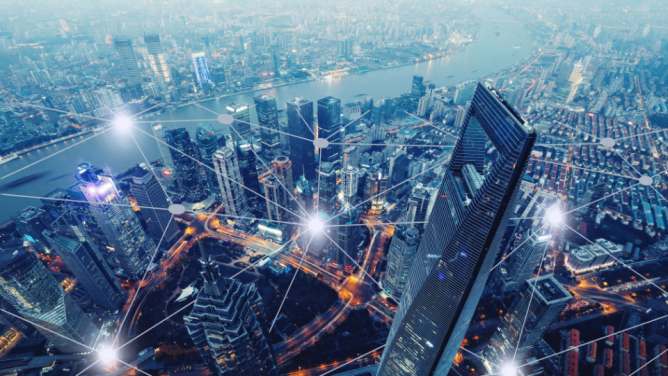In 2019, Hubert Beroche completed a world tour of smart cities following which he founded Urban AI, a think tank that conducts independent and alternative research on Urban Artificial Intelligences. Hubert is also an entrepreneur in residence at PCA-STREAM, a student at the Ecole Polytechnique and the author of the Metropolis newsletter. On the occasion of the forthcoming publication of the report Geopolitics of Urban Technologies, of which Leonard is a partner, Hubert Béroche answered a few questions from Pierre-Marie Gouédard, in charge of foresight projects at Leonard.
The subject you deal with in this report, the geopolitics of urban technologies, is quite innovative. Usually, work on the smart city is primarily concerned with technical aspects. How did you come up with the idea of conducting such work?
Last year, while working with Anna Chubinidze, an expert from the Urban AI network, on regulatory issues related to Artificial Intelligence, we realised that there were real power struggles between different regions of the world on this issue. We therefore sought to replicate the analysis to other fields, first and foremost urban technologies.
As civil technologies, urban technologies are most often considered neutral and relatively harmless. However, as we began to explore this topic, we quickly realised that these technologies crystallise real power issues and that they play a growing role on the international scene.
As this subject is still emerging, we used a three-stage methodology. First, we reviewed the existing literature, then we conducted interviews with experts from international institutions and large companies such as the World Economic Forum, the European Commission, the City of London, Huawei, Cisco and VINCI. Finally, we carried out an open research phase, presenting our first results at events at Science Po or in The Hague, in order to confront our work with different experts.
In a few words, what are the key points of the report?
The first key point is that we are witnessing a fairly profound geopolitical transformation since the end of the Cold War. Traditionally, geopolitics is above all an inter-state competition for the control of territories. However, we realise that this competition accepts new actors, in particular multinational companies and non- or inter-state organisations, new areas of confrontation, for example the cognitive domain and cyberspace, and new methods of confrontation. We have thus entered the era of what the political scientist Mark Leonard calls the ‘a-peace’, i.e. an era in which even if war remains the exception, it is never quite peace, in which each actor tries to use the interdependencies that unite them with the other actors to their advantage.
In this context, urban technologies are strategic elements on the international chessboard in two ways. The first is the outright militarisation of these technologies, particularly through cyber attacks. Urban technologies are regularly the target of attacks, with hostage-taking of key infrastructure such as hospitals, hijacking of drones, etc. While the militarisation of these technologies is most visible, they also serve as soft power tools.
To the extent that international actors are aware of these strategic aspects, a war of influence over these technologies ensues. These are real confrontations, with several modalities that are explored throughout the report, including the deployment of strategic narratives that the actors of these technologies will create.
Who is behind these stories? Is it the states directly, or do private companies play a role?
In our research, we have identified three clusters, each of which mobilises different actors and narratives.
The oldest is the North American pole. It was formed from 2008 onwards, around a coalition of heterogeneous actors: mainly high-tech companies and government agencies. It conveys the smart city narrative, which is now clearly identified and widespread – despite a decline since the abandonment of the Sidewalk Labs project in Toronto. This vision emphasises the idea that the city should be optimised through technology and that the well-being of city dwellers is quantified by access to urban goods and services. The smart city is also characterised by a form of privatisation of public space, or at least by the conviction that private actors have a key role to play in the regulation and management of urban life.
Opposite it, another pole of influence has emerged in China, which is much more monolithic because its vision stems directly from the Communist Party authorities – although it is then conveyed by private actors close to the government, such as Huawei. Their narrative is based on the idea that urban technologies should promote social order and political harmony. We find a much more secure discourse, which has been spreading around the world since 2018 and which powerfully echoes the urban challenges of emerging countries as well as the democratic foundations of developed countries. This is why this Safe City narrative is gaining so much ground, both in Africa and Asia as well as in South America and even, to some extent, in Europe.
Finally, between these two poles, Europe is trying to define its own discourse, notably through European institutions, local actors like cities and private actors. This third narrative, which is still in its infancy, develops a vision of the city in which ecology, privacy and citizen participation are key. Nevertheless, this vision is still in its infancy and is struggling to assert itself, particularly because of the multiplicity of European players and their sometimes divergent interests.
What surprised you during your research?
The first idea that caught my attention and that I find quite powerful is to define the smart city as a narrative, a sociolinguistic construction! Where it is usually defined by its technological or even economic components, we realised that it is above all a mythology. It is important to keep this in mind because it means that when we say that a city must become a smart city or a safe city, we are not stating a neutral objective that is guided by the quest for performance or safety. In saying this, we are relaying visions, in this case foreign (American and Chinese) visions, which are fraught with significance and consequences – geopolitical but not only.
I believe that we must also emphasise the capacity – often overlooked – of urban technologies to be instruments of soft power. In our report we show that these technologies can reconfigure spaces and urban behaviour. We know, for example, that Google Maps tends to create an agglomeration of activities around commercial areas, whereas European cities were built around other historical axes (religious, social, etc.).
Once we are aware of this phenomenon, we need to ask ourselves two questions. Does this vision, this narrative, to which we implicitly adhere by using these urban technologies really suit us? And if not, how can we break free from it and start developing technologies that are in line with our values?
About the Geopolitics of Smart Cities report
The Geopolitics of Smart Cities report seeks to explore the political, diplomatic and cultural dimensions of urban technologies. It argues that these technologies are becoming key instruments of geopolitical relations, with the emergence of poles such as the United States and China advocating opposing technological models – the Smart City and the Safe City. These poles are creating narratives to make their technological models desirable and to promote their diffusion across the globe. In this context, the report highlights the European Union’s efforts to develop its own narrative on the city of tomorrow.
Produced by the Urban AI think tank in partnership with Leonard, the Geopolitics of Smart Cities report will be published shortly in English. To be kept informed, subscribe to our newsletter.


